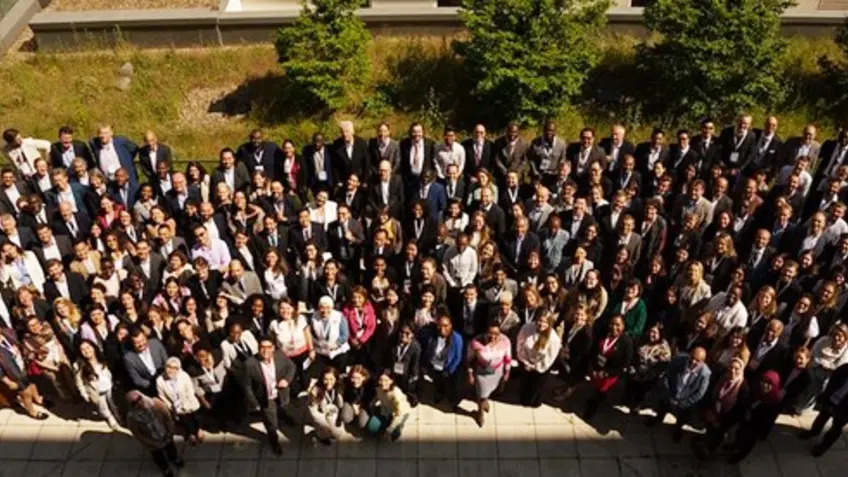Exploring Holistic Financial Mobilization for NDC Implementation
The mobilization of finance for NDC implementation is crucial for unlocking the transformative potential of both national and global climate commitments and driving tangible and meaningful climate-development action.
Despite widespread consensus that increasing climate finance will improve the ability of countries to fulfill their commitments under the Paris Agreement, accelerate low-carbon transitions and unlock co-benefits for overall sustainable development, persistent finance gaps remain. Now more than ever, it is critical to prioritize holistic, integrated approaches to national climate action that expand on national priorities, strengthen multi-sectoral perspectives for emission reductions, build resilience and unlock national and international financial resources from public and private sources.
At the 2023 Global NDC Conference in Berlin from 31 May to 2 June, more than 200 attendees from across the NDC Partnership and beyond convened to discuss climate finance and ways to mobilize financial resources for NDC implementation. The event provided an essential platform for highlighting and sharing practical examples of both private and public financial mobilization across the broader climate landscape with keynote speeches, interactive sessions, high level discussion and peer-learning.
“We have the technology we need to achieve our 2030 climate targets,” said German Federal Minister for Economic Affairs and Climate Action Robert Habeck, one of many insightful keynote speeches from the event. “What we need is the aligned will of policymakers and society, and the prioritization of climate finance.”
In another address, Günther Thallinger of Allianz SE underlined that aligning financial investments with projects remains an urgent challenge, particularly given the magnitude and speed of the transition needed. Thallinger also highlighted several key issues, including: understanding and managing risks, increasing capacities of the private and public sector on climate change, long-term planning and predictability, and scaling up blended finance.
Key takeaways from conference sessions centered on the significant gap between existing financial instruments and the needs on the ground, the urgency to scale up pipelines of bankable projects and the importance of blending strategies that match risk-return profiles with the investment criteria of different investors. Panelists also emphasized the need for increased engagement from the private sector, given that public funding will have limitations to operate at the scale and pace required.
The NDC Partnership organized a session on NDC Investment planning, where participants discussed the importance of whole-of-society approaches to mobilizing public and private finance for NDC implementation, including establishing and strengthening institutional frameworks, creating enabling environments and strategic processes for identifying, preparing, and matching climate investment needs with appropriate financial sources.
Further breakout sessions or “challenge labs” allowed practitioners and policymakers from over 40 countries, institutions, and projects to share their thoughts and experiences on a range of subtopics and focus areas, such as green financial transformation, urban climate action, global carbon market and private sector investments for adaptation. These sessions provided a thoughtful space for collective problem-solving through a participant-driven, peer-to-peer advisory process.
Climate finance is one of the most frequently requested support topics among NDC Partnership members and an increasingly essential component of Partnership Plans developed across the membership. Accordingly, the Partnership has amplified its focus on climate finance by creating several tools and offers to effectively support the collective transition to meaningful and effective mobilization of financial resources for climate action:
- The NDC Investment Planning Guide and Checklist provides step-by-step guidance for countries to develop investment plans based on current best practices at the NDC Partnership.
- Our 2022 Partnership in Action (PiA) Report: Finance for Implementation provides examples from across the Partnership of members and partners creating demand and supply solutions to bridging the finance gap.
- Our Insight Brief on Finance outlines trends and gaps in support for country requests for climate finance.
Since its inception, the Global NDC Conference has contributed to sharing experiences on climate governance, finance and transparency, inspiring policymakers and practitioners to accelerate the pace towards transformational climate action around the world.
The 2023 Global NDC Conference, which took place in Berlin from May 31 to June 2, was hosted by the German Federal Ministry for Economic Affairs and Climate Action (BMWK) and co-organized with Deutsche Gesellschaft für Internationale Zusammenarbeit (GIZ) GmbH, the NDC Partnership and the United Nations Development Programme (UNDP) under the International Climate Initiative (IKI).
